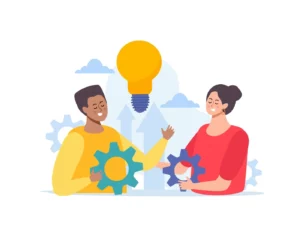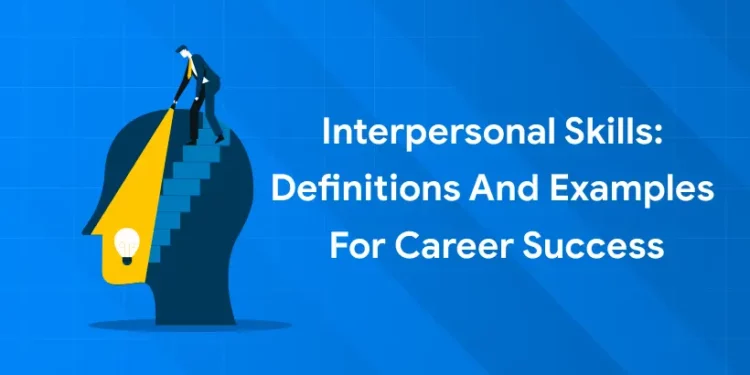Table of Contents
- Interpersonal skills are the foundation of effective communication, teamwork, and leadership in every industry.
- Employers increasingly prioritize soft skills such as adaptability, empathy, and emotional intelligence.
- Developing interpersonal skills can improve productivity, enhance professional relationships, and open paths to promotions.
- These skills can be strengthened through daily practice, constructive feedback, and professional courses.
- Entri’s Personality Development Course helps build confidence, communication, and people management abilities for workplace success.
Introduction
Have you ever sat through a meeting where your idea was misunderstood, or felt like your hard work went unnoticed? The problem may not be what you said—but how you communicated it. Interpersonal skills, often known as people skills, define your ability to connect with others genuinely and effectively. They’re not just about talking; they’re about understanding, listening, empathizing, and responding appropriately in every interaction.
In today’s hybrid work culture, interpersonal skills are a game-changer. As technology automates repetitive tasks, human connection becomes even more valuable. Whether you’re leading a project, managing clients, or collaborating remotely, your ability to engage with others with authenticity and tact determines how far you go. Think of these skills as your “career currency”—the more you build, the more opportunities come your way.
What Are Interpersonal Skills?
Interpersonal skills are a set of abilities that help individuals interact positively with others. They combine personality traits, emotional intelligence, and communication techniques to improve understanding and cooperation.
Also read: Top Personality Development Tips
Core Interpersonal Skills at a Glance
| Skill | Description | Example |
|---|---|---|
| Communication | Expressing ideas clearly verbally and nonverbally | Giving concise feedback during meetings |
| Active Listening | Paying attention to understand others before replying | Nodding and paraphrasing a colleague’s point |
| Empathy | Understanding others’ emotions and viewpoints | Listening patiently to client concerns |
| Teamwork | Working collaboratively toward shared objectives | Coordinating with colleagues on a project launch |
| Adaptability | Remaining flexible and positive during change | Adjusting to new tools or project structures |
| Leadership | Motivating others to achieve goals | Leading a group brainstorm session effectively |
| Conflict Resolution | Managing disagreements constructively | Negotiating deadlines between departments |
| Reliability | Being dependable and accountable for tasks | Submitting deliverables consistently on time |
Boost Your Skills & Kickstart Your Career!
Employability and Personality Development Course by Entri App: Enhance your communication, confidence, and job-ready skills to excel in your career.
Join Now!Major Examples of Interpersonal Skills
-
Communication
- Sharing ideas, instructions, and feedback clearly in meetings, emails, or one-on-one conversations.
- Adapting tone and style to suit different audiences, preventing miscommunication and ensuring messages are understood.
People also read: An Introduction to Communication: Types and Barriers
-
Active Listening
- Giving full attention to speakers, asking clarifying questions, and paraphrasing to ensure understanding.
- Using listening to solve misunderstandings or improve customer/client satisfaction.
-
Empathy
- Recognizing colleagues’ emotions and showing genuine concern for their well-being.
- Offering support to a teammate struggling with personal or work issues, fostering trust and loyalty.
-
Teamwork
- Collaborating on group projects, respecting and valuing everyone’s ideas, and pitching in to reach shared goals.
- Dividing roles and supporting team members, especially under pressure or tight deadlines.
-
Conflict Resolution
- Navigating disagreements calmly and objectively, focusing on collective goals and finding compromises.
- Mediating between coworkers to resolve disputes, maintaining a positive and productive work environment.
-
Leadership
- Inspiring and motivating others to achieve shared objectives, taking initiative on tasks or projects.
- Providing clear direction, constructive feedback, and recognizing achievements to guide the team through challenges.
-
Adaptability
- Adjusting quickly to changes in tasks, roles, or organizational priorities.
- Embracing new technologies, strategies, or working styles with positivity and professionalism.
-
Dependability/Reliability
- Meeting deadlines, following through on commitments, and being a trusted team member.
- Consistently delivering quality work and being counted on for important tasks.
-
Constructive Feedback
- Providing honest, actionable insights to help others improve without being critical or discouraging.
- Accepting feedback gracefully and using it for personal and professional growth.
-
Problem-Solving
- Analyzing challenges, brainstorming ideas, and implementing solutions with a collaborative mindset.
- Tackling obstacles creatively, often with input from others for best results.
-
Positive Attitude
- Maintaining optimism and approachability even during high-pressure situations or setbacks.
- Encouraging colleagues and contributing to a resilient, motivated work atmosphere.
-
Self-Awareness
- Understanding one’s strengths, weaknesses, and emotional triggers to improve interactions.
- Owning up to mistakes and taking responsibility to build respect and trust within the team.
These interpersonal skills together help create healthy, collaborative, and productive workplaces, making them vital for every career path.
Why Interpersonal Skills Matter
Strong interpersonal skills influence every level of professional success. Below are data-backed reasons they matter:
| Reason | Insight/Statistic |
|---|---|
| Improved Communication | 70% of workplace failures link to poor communication |
| Boosted Team Productivity | Teams with strong interpersonal skills outperform by 25% |
| Higher Employability | 57% of recruiters consider communication the most valuable soft skill |
| Enhanced Leadership Potential | Emotional intelligence accounts for over 90% of leadership success |
| Better Work Relationships | People with empathy and respect enjoy higher workplace satisfaction |

How to Identify and Improve Interpersonal Skills
Identifying Your Current Interpersonal Skills
Use the tips below to assess your strengths and improvement areas:
- Reflect on past team or client interactions—note what went well and what caused friction.
- Seek peer or supervisor feedback on your communication and teamwork.
- Take online personality or soft skills assessments.
- Record yourself during presentations to review tone and clarity.
Ways to Improve Your Interpersonal Skills
| Area | Method to Improve | Example |
|---|---|---|
| Communication | Practice public speaking or join Toastmasters | Present in team huddles weekly |
| Empathy | Volunteer or mentor to understand perspectives | Support a new colleague onboarding |
| Active Listening | Use summarizing and clarification in talks | “So you mean we should begin earlier?” |
| Conflict Resolution | Learn negotiation techniques | Handle deadline disputes calmly |
| Adaptability | Participate in cross-functional teams | Work on projects beyond your role |
| Reliability | Set and meet realistic deadlines | Maintain transparency if delayed |
Boost Your Skills & Kickstart Your Career!
Employability and Personality Development Course by Entri App: Enhance your communication, confidence, and job-ready skills to excel in your career.
Join Now!How to Showcase Interpersonal Skills in Resumes & Interviews
Communicating your interpersonal strengths effectively helps recruiters visualize your potential.
In Your Resume:
- Use action verbs—“collaborated,” “facilitated,” “negotiated,” “resolved.”
- Highlight results-oriented examples, not generic claims.
- Keep bullet points concise and measurable.
Example: “Facilitated cross-department collaboration that reduced delays by 30%.”
You might also like: Top Communication Skills for A Resume (With Examples)
In Your Cover Letter:
Share mini-stories showing empathy or teamwork—how your people skills solved real problems.
In Interviews:
| Focus Area | How to Demonstrate |
|---|---|
| Listening | Maintain eye contact, avoid interruptions |
| Confidence | Answer clearly, use positive tone |
| Collaboration | Refer to past team wins |
| Leadership | Share examples of guiding others |
Common Careers That Depend Heavily on Interpersonal Skills
| Career/Role | Key Interpersonal Skills Required | Why It Matters |
|---|---|---|
| Teacher | Communication, Empathy, Motivation | Enhances student engagement and learning |
| Healthcare Professional | Active Listening, Patience, Empathy | Builds trust with patients and families |
| Customer Service Representative | Problem-Solving, Adaptability, Positive Attitude | Improves customer experience and retention |
| Project Manager | Leadership, Conflict Resolution, Delegation | Keeps teams aligned and productive |
| Sales Executive | Persuasion, Relationship Management, Confidence | Drives customer conversions |
| HR Manager | Emotional Intelligence, Negotiation, Communication | Helps maintain workplace balance |

Grow Professionally with Entri’s Personality Development Course
Looking to build communication finesse and leadership presence? Entri’s Personality Development Course helps you master interpersonal effectiveness through:
- Step-by-step modules on communication, listening, and self-confidence
- Expert-led sessions focusing on body language and workplace etiquette
- Real-world case studies and feedback from certified trainers
- Lifetime access to practice resources
Why choose Entri:
| Feature | Benefit |
|---|---|
| Expert Mentors | Learn communication and emotional intelligence from industry leaders |
| Career-oriented Curriculum | Improves both interview readiness and leadership versatility |
| Flexible Learning | Access anytime from mobile or web |
| Certification | Boosts resume and LinkedIn credibility |
Conclusion
Interpersonal skills are not optional—they’re essential in building fulfilling careers and meaningful professional relationships. They define how you connect, influence, and grow. Every successful negotiation, every strong team, and every inspiring leader shares one thing in common: exceptional interpersonal awareness.
By investing in structured learning—like Entri’s Personality Development Course—you equip yourself with skills that transform your personal brand, boost your confidence, and set you apart in competitive job markets. Start enhancing your interpersonal skills today and lead your career with empathy, purpose, and clarity.
Boost Your Skills & Kickstart Your Career!
Employability and Personality Development Course by Entri App: Enhance your communication, confidence, and job-ready skills to excel in your career.
Join Now!Frequently Asked Questions
What are interpersonal skills?
Interpersonal skills are the personal traits and communication abilities that enable you to interact effectively and harmoniously with others, both professionally and personally.
How can I improve interpersonal skills quickly?
Practice active listening, participate in group activities, and consider enrolling in soft skills or personality development workshops.
Which interpersonal skills are most in-demand in 2025?
Communication, adaptability, empathy, and conflict management are among the top interpersonal skills employers seek in hybrid workplaces.
Can technical professionals benefit from improving their interpersonal skills?
Yes. Even in technical roles, collaboration, presentation clarity, and teamwork are vital for innovation and career advancement.
How do I measure if I’ve improved?
Notice smoother team interactions, positive feedback, and greater confidence in expressing ideas as signs of progress.














